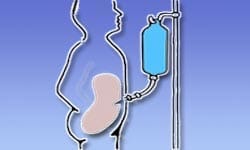 |
Overview: Renal Insufficiency:
Magnesium is excreted solely by the kidney.
In patients with severe renal insufficiency (e.g. < 30 ml/min), the dose should be lower and frequent serum magnesium levels must be obtained
Caution should be used when replacing magnesium in any patient with renal insufficiency.
Magnesium balance is primarily a kidney function (magnesium intake does not appear to be regulated). The average diet provides 20 - 30 mEq daily, but the net absorption is only about 7 mEq. The kidneys normally excrete an equal amount in order to maintain the magnesium balance. However, in the presence of magnesium deficiency urinary magnesium excretion can be reduced to a minimum of about 2 mEq/day. Renal magnesium reabsorption takes place primarily in the proximal tubule (30% of the filtered load) and the thick ascending limb of Henle's loop (65%). Overall renal reabsorption appears to be saturable, so that a higher magnesium intake results in a proportional increase in urinary excretion. For this reason, it is difficult for patients with normal renal function to develop hypermagnesemia. |


